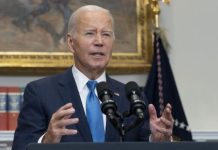Sept. 23 (UPI) — The nation’s leading infectious diseases expert, Dr. Anthony Fauci, told Congress on Wednesday that he believes the United States will have enough doses of a coronavirus vaccine to distribute to every American by April.
His prediction moves up the timeline Centers for Disease Control and Prevention Director Dr. Robert Redfield gave Congress last week.
Fauci, who is director of the National Institute of Allergy and Infectious Diseases, said it’s possible for an effective vaccine to become available as soon as late October or early November.
“In November you’ll probably have maybe 50 million doses available,” he told the Senate appropriations subcommittee. “By December, maybe another 100-plus million. And then you get into January and February. By the time you get to April, it’ll be a total of about 700 million.
“They will be rolling in as the months go by and by the time you get to maybe the third or fourth month of 2021, then you’ll have doses for everyone.”
The United States has a population of about 328 million people.
Fauci said scientists should know if a vaccine is safe and effective by November or December, but Dr. Stephen Hahn, commission of the Food and Drug Administration, said his agency won’t rush the approval process.
“FDA will not authorize or approve any COVID-19 vaccine before it has met the agency’s rigorous expectations for safety and effectiveness,” he told Congress.
“Decisions to authorize or approve any such vaccine or therapeutic will be made by the dedicated career staff at DA, through our thorough review processes, and science will guide our decisions.”
Questioning turned heated when Sen. Rand Paul, R-Ky., suggested the coronavirus cases have come down in New York City because the one-time U.S. epicenter of the disease had reached herd immunity. Fauci rigorously rebuked the idea, telling Paul he’s “not listening.”
About 22% of New York’s population have developed immunity to the virus, but the World Health Organization says 60% to 80% of a populace must have immunity to achieve herd immunity.
“If you believe that 22% is herd immunity, I believe you’re alone in that,” Fauci told Paul.
“Right now if you look at what’s going on right now, the things that are going on in New York to get their test positivity 1% or less is because they are looking at the guidelines that we have put together from the task force of the four or five things of masks, social distancing, outdoors more than indoors, avoiding crowds and washing hands,” Fauci said.
The United States added almost 40,000 COVID-19 cases on Tuesday, according to updated data from Johns Hopkins University.
Data Wednesday from the university’s Center for Systems Science and Engineering showed 39,300 new COVID-19 cases and 921 deaths. The death toll for Tuesday was the highest in four days.
Since the start of the pandemic, there have been 6.92 million cases and 201,300 deaths in the United States, according to Johns Hopkins as of Wednesday afternoon. The national total surpassed 200,000 on Tuesday.
Data shows a national average of 858 deaths per day since Feb. 6, the date of the first known death.
Johnson & Johnson said Wednesday it has begun the final stage of clinical trials for its vaccine candidate.
The trial is partly funded by the National Institute of Allergy and Infectious Diseases and will seek to enroll participants in the United States, Argentina, Brazil, Chile, Colombia, Mexico, Peru and South Africa.
In Wisconsin, Gov. Tony Evers declared a new public health emergency amid one of the nation’s quickest outbreaks, which officials believe is being driven by students returning to college campuses.
Evers extended a statewide mask mandate through late November and said Wisconsin is seeing an “unprecedented, near-exponential growth” of the virus.
Statistics show there has been a near three-fold increase in Wisconsin cases over the past three weeks — and the state had the nation’s highest average over the past week of 46 cases per 100,000 residents, according to the Harvard Global Health Institute.
“We are seeing an alarming increase in cases across our state, especially on campus,” Evers said. “We need folks to start taking this seriously, and young people especially — please stay home as much as you are able, skip heading to the bars, and wear a mask whenever you go out.”
The number of COVID-19 hospitalizations reached an all-time high in Wisconsin Tuesday, state health figures show.






